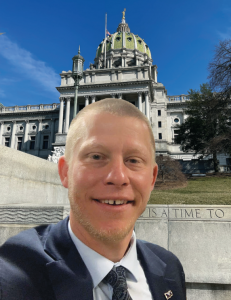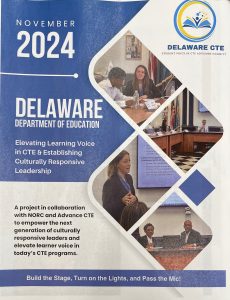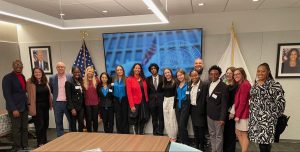Over the last few weeks lawmakers have begun to make progress towards agreement on full-year funding for the federal budget. In addition, the House is expected to host a hearing next week examining how to best prepare students for the workforce. Meanwhile, the U.S. Department of Education (ED) issues new guidance related to pandemic aid funding and proposes new rules for federal grant programs.
Congressional Leaders Announce FY24 Topline Agreement
 Just before returning to Capitol Hill following Congress’ annual holiday recess, House Speaker Mike Johnson (R-LA) and Majority Leader Chuck Schumer (D-NY) announced that they had reached agreement on aggregate spending levels, also known as toplines, for defense and non-defense discretionary portions of the federal budget. The agreement largely aligns with the requirements contained in the Fiscal Responsibility Act (FRA)—legislation enacted last year that suspended the nation’s statutory borrowing limit while establishing a budget framework for federal fiscal years 2024 (FY24) and FY25. This agreement also included a “side deal” agreed to by former Speaker Kevin McCarthy (R-CA), Congressional Democrats and the Biden administration to provide approximately $69 billion in additional funding, beyond what was contained in the FRA, to avoid substantial cuts to non-defense discretionary (NDD) programs like federal investments in Career Technical Education (CTE).
Just before returning to Capitol Hill following Congress’ annual holiday recess, House Speaker Mike Johnson (R-LA) and Majority Leader Chuck Schumer (D-NY) announced that they had reached agreement on aggregate spending levels, also known as toplines, for defense and non-defense discretionary portions of the federal budget. The agreement largely aligns with the requirements contained in the Fiscal Responsibility Act (FRA)—legislation enacted last year that suspended the nation’s statutory borrowing limit while establishing a budget framework for federal fiscal years 2024 (FY24) and FY25. This agreement also included a “side deal” agreed to by former Speaker Kevin McCarthy (R-CA), Congressional Democrats and the Biden administration to provide approximately $69 billion in additional funding, beyond what was contained in the FRA, to avoid substantial cuts to non-defense discretionary (NDD) programs like federal investments in Career Technical Education (CTE).
The agreement is a critical next step in the FY24 budget and appropriations process that has been ongoing since October 1 of last year. Appropriations leaders must now work to negotiate 302(b) allocations—funding levels for each of the 12 individual appropriations bills that compose the federal budget and then subsequently determine program-level funding for federal initiatives and programs like the Carl D. Perkins Career and Technical Education Act (Perkins V). Current federal funding, which has been operating under two separate continuing resolutions (CRs) that temporarily extended FY23 funding levels for separate portions of the federal budget, is set to expire on January 19 and February 2 respectively. Lawmakers will need to act by these dates, likely via another short-term CR, to avert a partial or full shutdown of the federal government as they continue to negotiate program allocations under this new FY24 agreement.
Complicating the pathways forward, a faction of conservative House Republicans has voiced significant opposition to this topline agreement and has recently made efforts to stymie legislative progress on this issue in protest of the accord. It remains unclear at this time how Congressional leaders in both chambers will chart a course forward as they continue to develop and finalize FY24 appropriations legislation. As these efforts continue to take shape, Advance CTE will be advocating for a strengthened investment in Perkins V’s basic state grant program, along with other critical investments in education and workforce development of interest to the wider CTE community.
House Education Subcommittee to Hold Hearing Next Week
Next Thursday, January 18, at 10:15 a.m., the House Subcommittee on Early Childhood, Elementary and Secondary Education, chaired by Rep. Aaron Bean (R-FL), plans to hold a hearing titled: “Preparing Students for Success in the Skills-Based Economy.” The subcommittee has not yet published the witness list for the hearing but it is expected to focus broadly on strategies and efforts to prepare learners for growing and in-demand careers. The hearing will be live-streamed here.
ED Issues Guidance on Pandemic Funding
On Tuesday, January 9, the U.S. Department of Education’s Office of Elementary and Secondary Education (OESE) issued a guidance letter outlining the process K-12 schools and districts must undertake to obtain an extension to spend down remaining federal aid provided by Congress in response to the COVID-19 pandemic. The Department is encouraging grantees to request an extension on this year’s spending deadline by December 31, 2024 and outline how such an extension will contribute to the core goals and objectives of these funds. More information on how to apply for additional funding flexibilities, including related forms, can be accessed here.
ED Proposes Grant Rule Changes
This week ED also published a notice of proposed rulemaking (NPRM) that aims to amend the Education Department General Administrative Regulations (EDGAR). The proposed rule would make a series of technical updates to EDGAR, which provides an overarching framework for the agency’s administration of discretionary and formula grant programs. The proposed changes range from technical updates to substantive revisions intended to streamline existing regulations, align EDGAR more closely with other more recently passed federal legislation and increase flexibility in grant administration. In the NPRM, ED estimates the proposed rule would result in a net reduction of burden for grantees. Most amendments are technical in nature or provide additional flexibilities. ED is soliciting comments from the public for the next 45 days and will close on February 26.
Steve Voytek, Policy Advisor


 A former Business and Marketing teacher Candi Collier has been in the world of Career Technical Education (CTE) for 22 years. After serving six years at the Tennessee Department of Education, Candi went back to the field to serve as the CTE Director of Milan Special School District in Milan, Tennessee.
A former Business and Marketing teacher Candi Collier has been in the world of Career Technical Education (CTE) for 22 years. After serving six years at the Tennessee Department of Education, Candi went back to the field to serve as the CTE Director of Milan Special School District in Milan, Tennessee.  Earlier this year, Brett Robinson was appointed as Mississippi’s State CTE Director. He brings a strong background of experience in secondary education and Career Technical Education (CTE)—b
Earlier this year, Brett Robinson was appointed as Mississippi’s State CTE Director. He brings a strong background of experience in secondary education and Career Technical Education (CTE)—b While most states are primarily updating state-determined performance levels (SDLPs) as required every four years by law, others are using this opportunity to make larger, substantive changes or write a new state plan. This post offers some insights on what we are hearing from state CTE leaders so far about their goals for state plan updates, and the spaces and resources Advance CTE is providing to support this process.
While most states are primarily updating state-determined performance levels (SDLPs) as required every four years by law, others are using this opportunity to make larger, substantive changes or write a new state plan. This post offers some insights on what we are hearing from state CTE leaders so far about their goals for state plan updates, and the spaces and resources Advance CTE is providing to support this process. 
 Before serving as the State Career Technical Education (CTE) Director, Judd worked in forestry as an ecologist conducting climate science research in Pennsylvania and in Canada.
Before serving as the State Career Technical Education (CTE) Director, Judd worked in forestry as an ecologist conducting climate science research in Pennsylvania and in Canada. Connecticut’s 2019 Senate Bill 356 “An Act Establishing the Connecticut Apprenticeship and Education Committee” (
Connecticut’s 2019 Senate Bill 356 “An Act Establishing the Connecticut Apprenticeship and Education Committee” ( Last month, I had the privilege of attending a briefing at the U.S. Department of Education, led by a group of Career Technical Education (CTE) learners from the state of Delaware. Their expertise and passion demonstrated the true power, inspiration and innovation that can come from centering learners in matters of policy and practice within CTE.
Last month, I had the privilege of attending a briefing at the U.S. Department of Education, led by a group of Career Technical Education (CTE) learners from the state of Delaware. Their expertise and passion demonstrated the true power, inspiration and innovation that can come from centering learners in matters of policy and practice within CTE.